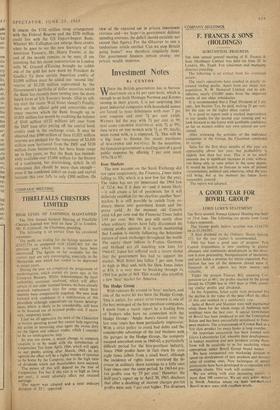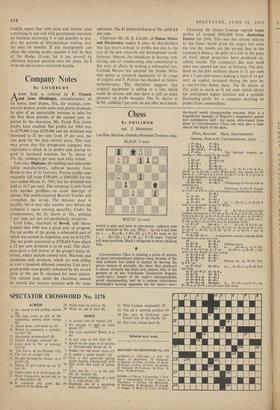Investment Notes
By CUSTOS
WHEN the British government has to borrow short-term on a 61 per cent basis, which is enough to set both Montagu Norman and Keynes turning in their graves, it is not surprising that great industrial companies with household names arc forced to issue debentures with over 7 per cent coupons and over 71 per cent yields. WAINEY led the way with 7+ per cent at 99; next came CHLORIDE ELECTRICAL with 71 at 991; then NEWS OF THE WORLD with 71 at 99; finally, REED PAPER with, it is expected, 71-. This will be a big issue to finance the recent purchases of WALLPAPER and POLYCELL. In the meantime, the Jamaican government is making sure of a good public response by offering 7 per cent stock 1976-78 at 97.
Bear Markets
The new account on the Stock Exchange did not open auspiciously, the Financial Times index falling to 326, which is a new low for the year. The index has not yet penetrated the 1964 low of 322.6, but if it does so—and it seems likely —it will create a lot of pessimism. for it will definitely establish for the chartists another 'bear' market. It is still possible to switch from or- dinary shares into goverment bonds and im- prove yield. At the moment old Consols yield 6.8• per cent and the Financial Times index 5.95 per cent. But this gap will surely close when ordinary shares have fully discounted the coming profits squeeze. It is worth mentioning that London is merely following the behaviour pattern of stock exchanges throughout the world. The equity share indices in France, Germany and Holland are all touching new lows for 1964-65. Japan has suffered such a severe slump that the government has had to support the market. Wall Street has fallen 7 per cent from its high in May and, with the Dow Jones index at 874, it is very near to breaking through its 1964 low point of 868. This would also establish a new 'bear' market for America.
The Hodge Group
Wild rumours fly around in 'bear' markets, and one of the worst hit has been the Hodge Group.
This is unfair, for ANGLO AUTO FINANCE is one of the best managed of the hire-purchase companies. I quote from a recent report by a leading 'firm of brokers who have no connection with the Hodge Group: 'Anglo Auto's record over the last nine years has been particularly impressive. With a strict policy to avoid bad debts and the considerable advantage of the tied business with the garages in the Hodge Group, the company escaped unscathed even in 1960-62, a particularly difficult period for the hire-purchase industry. Since 1960 profits have in fact risen by over eight times (albeit from a small base), although the incidence of rights issues restricted the in- crease in ordinary share earnings to a little over four times over the same period. In 1963-64 pre- tax profits rose by 55 per cent.' However, the half-year's report up to April 30, 1965, discloses that after a doubling of interest charges pre-tax profits were only 5 per cent higher. The directors ,frankly report that with costs and interest rates continuing to rise and with government restraints on business increasing it is not possible to pre- dict the pattern of hire-purchase trading over the next six months. If any management can offset the coming profits squeeze it will be that of the Hodge Group, for it has proved its efficiency beyond question over the years. As I write the shares have recovered sharply.







































 Previous page
Previous page